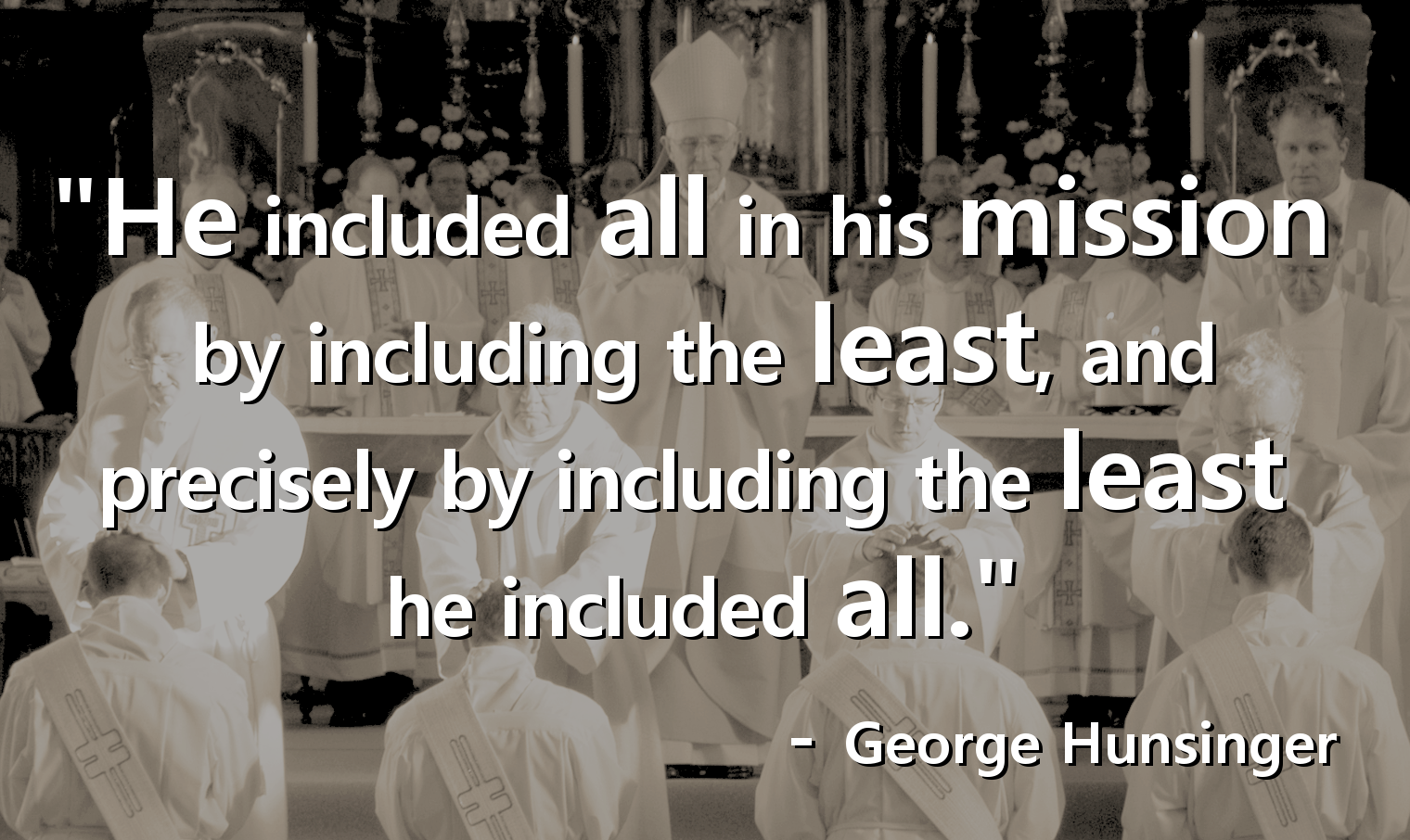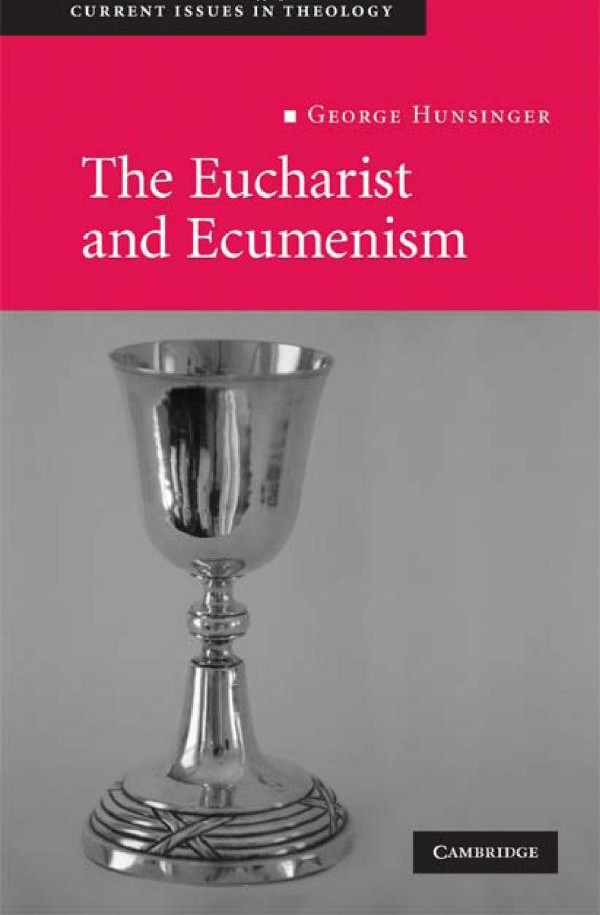 George Hunsinger's The Eucharist and Ecumenism: Let Us Keep The Feast (Current Issues in Theology) is among the best theology books published in recent years. George Hunsinger is the "Hazel Thompson McCord Professor of Systematic Theology" at Princeton Theological Seminary and an expert on Karl Barth. Eucharist and Ecumentism is a proposal for unifying the universal church, and how to overcome the dogmas that have divided Christendom. The book focuses on two particular points of division: the Lord's Supper and Ecclesiology.
George Hunsinger's The Eucharist and Ecumenism: Let Us Keep The Feast (Current Issues in Theology) is among the best theology books published in recent years. George Hunsinger is the "Hazel Thompson McCord Professor of Systematic Theology" at Princeton Theological Seminary and an expert on Karl Barth. Eucharist and Ecumentism is a proposal for unifying the universal church, and how to overcome the dogmas that have divided Christendom. The book focuses on two particular points of division: the Lord's Supper and Ecclesiology.
Unity in the Eucharist is proposed through the doctrine of transelementation, which teaches that the bread and wine of the Lord's Supper are the real body and blood of Christ Jesus by the way of analogy to Christology: fully bread and wine, and fully body and blood. The Eastern Orthodox doctrine of transelementation, in Hunsinger's opinion, is the best proposal of a doctrine of the Eucharist that all branches of the universal Church to embrace. Unity in Ecumenism is proposed through a flattened episcopacy. Hunsinger admits that he does not have a solution for unifying some branches of the Church, such as the Pentecostal Churches, and that some unification of Churches such as with the Eastern Orthodox may have to be done by Roman Catholics or other specific groups.
The Eucharist and Ecumenism addresses many difficult and controversial questions, including women as presbyters and bishops, and ordination of homosexuals. I've selected the following quotation that provides Hunsinger's Chastity Argument for the Ordination of Homosexuals that is an example of how Hunsinger addresses various points of division. Hunsinger has written longer essays that treat the topics briefly addressed in the following quotation. For more information, here is a series of five essays on this topic: There is a Third Way, Thinking Outside the Box: (Part 1/4), (Part 2/4), (Part 3/4), and (Part 4/4).
The Eucharist and Ecumenism
by George HunsingerWho is qualified to be ordained?
The Reformed and the Catholic churches both recognize formal training as a prerequisite to ordination. Without formal training, presbyters responsible for evangelical teaching and for presiding at sacramental celebrations are not qualified. (The matter of deacons and of presbyters assigned with different duties will be touched upon later.) At the time of the Reformation, the question arose in the West about whether ordinands must take a vow of celibacy. (With certain restrictions Eastern Orthodoxy allows for married clergy.) More recently, the question has arisen about whether ordination must be restricted to males. And most recently still, some Protestant churches have struggled with whether ordination can be extended to practicing gays and lesbians.
The Roman Catholic position on these questions is well known. Ordination is restricted to males who have taken a vow of celibacy. [16] Along with other Protestant churches, the Reformed hold that a vow of celibacy is not required, and that, for ministers of Word and Sacrament, marriage is appropriate. Moreover, while some Reformed churches still restrict ordination to males, many have now changed so that in their presbyteries and congregations, female ministers of Word and Sacrament have become common. Extending ordination to non-celibate gays and lesbians is a vexing question that is passionately contested today in the Reformed churches and elsewhere, but one that has yet to be resolved.
If the ordained ministry of the church is always a participation in the one ministry of Jesus Christ, then as Christ alone is qualified to ordain, so also he alone is qualified to be ordained. His ordination, so to speak, was his being sent into the world by the Father. This sending was determined in eternity, actualized in his birth, manifested in his baptism, and fulfilled in his cross. It was then validated in his glorious resurrection. His being sent marked him out as a friend of sinners and social outcasts. He included all in his mission by including the least, and precisely by including the least he included all. Having overcome all vertical separation between God and humankind in himself for the sake of the world, he also overcame in himself all horizontal or social divisions as well. “For in Christ Jesus you are all children of God through faith . . . There is no longer Jew or Greek, there is no longer slave or free, there is no longer male and female; for all of you are one in Christ Jesus” (Gal. 3:26, 28).
When viewed in this light, participatio Christi would seem to point in the direction of inclusiveness when considering who can be admitted to ordination. If all who participate in Christ participate in his mission, they must all have a share in his one ordination, each in a particular and appropriate way. It would seem difficult to exclude any of the faithful from service through ecclesial ordination merely on the basis of categories like ethnicity, social status, gender or sexual orientation.
These matters of course are not simple, and they can hardly be resolved here. Certainly the Reformed and the Catholics would agree, however, that holiness of life is required for all Christians, and especially for those who would be ordained to the offices of presbyter or bishop. Holiness of life is rightly central to current disputes in the Protestant churches about gay and lesbian ordination. Let me comment on this latter question briefly from a Reformed perspective. In another place I have argued that the standard which all Christians must meet in their sexuality is chastity. This standard, which rules out every form of casual, promiscuous, and abusive sexuality, applies across the board. Chastity, I have argued, applies to all Christians whether they are single or married, male or female, straight or gay. It applies especially to ordained ministers: bishops, presbyters, and deacons. I have further proposed that gays and lesbians who have committed themselves to fidelity within a lifelong partnership should be regarded as meeting the chastity standard. Therefore they should not automatically be excluded from eligibility for ordained ministry.[17]
This is of course a very Protestant argument that not even all Protestants would accept. At a minimum many would object that my proposal flies in the face of Holy Scripture in its sensus literalis. Here I would only note that this kind of scriptural objection, while it might also be made by Eastern Orthodox and Roman Catholics, is not only broadly Protestant but also distinctively Reformed. An appeal to Scripture is the kind of warrant that the Reformed typically bring to the question of ministry. Catholics, however, operate with another kind of warrant that the Reformed do not share. Not only is ordination seen by Catholics as a sacrament, but the bishop, the presbyter, and the deacon are also, as it were, profoundly sacramental in their official persons. “Representation” plays a key role in Catholic conceptions of who is qualified to be ordained, a role it has not played for the Reformed. Because especially the presbyter and the bishop are seen in their consecrated persons as sacramental representations of Christ, ordination cannot easily be extended by the Catholic church to include those who are non-celibate and non-male. Only celibate males are qualified to serve as representations of Christ. We have here an initial indication of how eucharistic ministry is determined for Roman Catholics by a distinctively sacramental imagination.
- [16] More precisely, a vow of celibacy is required for Latin Rite Catholic priests, but not for those of the Eastern Rite. eucharistic ministry: controversies
- [17] See George Hunsinger, “There is a Third Way,” Presbyterian Outlook (November 26, 2001); “Thinking Outside the Box,” parts 1–4, Presbyterian Outlook (March 4, 11, 18, 25, 2002); “On Chastity,” Presbyterian Outlook (June 3, 2002). In these articles I chart a course that avoids the polarized extremes of celebration and prohibition. Seeking to defuse this highly charged issue (and so disappointing nearly everyone), I argue for non-approval, sober discretion, and principled accommodation. the eucharist and ecumenism
Hunsinger, George. The Eucharist and Ecumenism: Let Us Keep the Feast (Current Issues in Theology). New York: Cambridge UP, 2008. 200-03. Print.




February 5th, 2015 - 23:10
Thanks for this. Definitely something to grapple with and seriously consider.